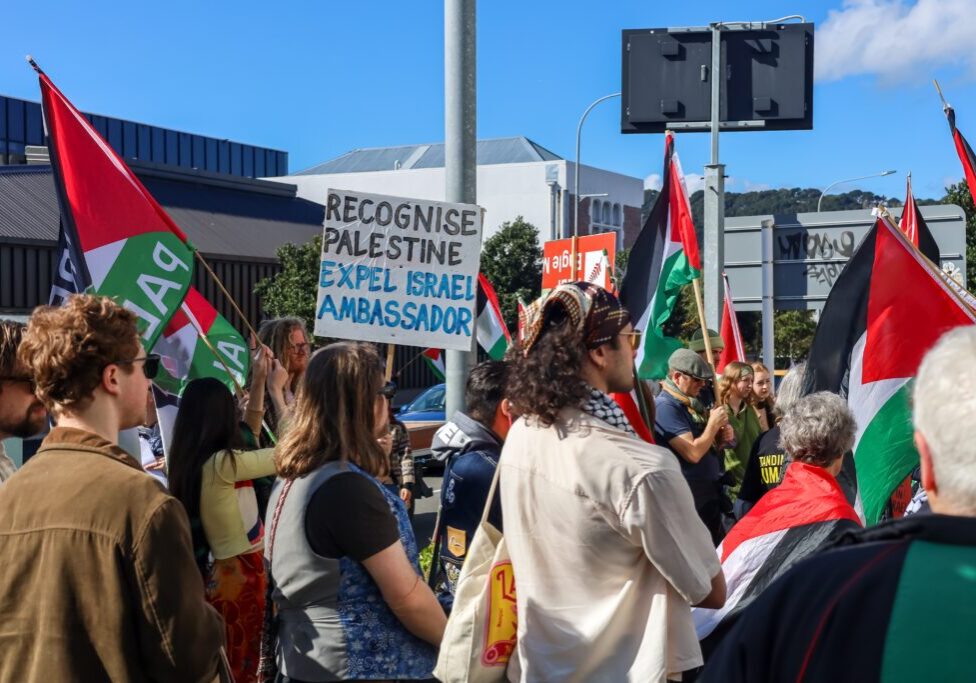Australia/Israel Review
Abbas’ Five Non-Options
Oct 30, 2012 | Tal Becker

The PA leadership’s untenable situation
Tal Becker
At a time when the Middle East is in upheaval, the Israeli-Palestinian conflict has been pushed to the margins of the diplomatic agenda. The Islamist surge in the region has emboldened Hamas’ political ambitions and is making Palestinian Authority (PA) President Mahmoud Abbas’ Fatah party feel ever more isolated and anachronistic. The loss of former Egyptian leader Hosni Mubarak, and the Arab uprisings more broadly, have relegated Abbas to the back burner. As crisis escalates with Iran, the bloodbath in Syria continues, Egypt undergoes unprecedented change, and the region as a whole finds itself in a period of profound uncertainty, the goal of Palestinian statehood alongside Israel seems, to many, neither possible nor pressing.
After years of frustration with the conventional negotiation track, President Abbas has toyed increasingly, though not always convincingly, with other options. Eager to maintain political relevance, and at least the semblance of progress, the PA has threatened intermittently to embark upon some new initiative. Potential for an economic crisis and growing signs of unrest in the West Bank have only intensified the search for popular policy alternatives. But despite the hype often associated with these proposals, the Palestinian leadership has consistently failed to follow through.
In the end, however, the tendency to advance and then abandon these options has served to underscore the emptiness of Palestinian threats and entrench a pervasive Palestinian sense of helplessness about the present situation. The overall impact has been to highlight Abbas’ severe constraints (some, perhaps, self-generated) rather than elicit the desired response either from Israel or from the international community.
It is worth understanding the nature of Abbas’ indecision in relation to the policy options that regularly feature in Palestinian rhetoric and calculations. Such analysis not only presents a picture of Abbas’ mindset. It presents a dire warning about the increasingly untenable state of the current Palestinian leadership, about the growing risk of a steady descent into violence, and about the degree of energy that is required to move things off their present, dangerous, trajectory.
1. Negotiations
From a Palestinian perspective, a meaningful negotiating process with the present Israeli Government has long been discounted. But it is too simplistic to attribute this merely to the Palestinian assessment that the kind of deal that could be sold to the Palestinian public cannot be reached with Israeli Prime Minister Binyamin Netanyahu’s coalition. Many other factors are at play, not least the turmoil of the Arab uprisings, and the questions of legitimacy and popularity that cast a shadow over the PA in general, and Abbas in particular.
The present volatile regional environment arguably renders the kinds of heart-wrenching decisions any peace agreement requires of any Palestinian leader exceedingly unpopular and politically out of reach, virtually regardless of Israel’s position. Indeed, even if Netanyahu’s coalition were to meet current Palestinian preconditions for negotiations and show exceptional flexibility at the table, Abbas would still find it difficult to take yes for an answer.
The PA President knows only too well that even modest compromises with Israel will have him labeled as a traitor to the Palestinian cause before core Palestinian and Arab constituencies. Hamas, key elements in the Palestinian diaspora, and some of his own Fatah colleagues will no doubt be part of this chorus. This has always been a difficult proposition for Abbas.
In the past, his calculation has been that Arab states could provide the legitimacy for a deal and act as a counterweight to public opposition. Presently, he harbours no illusion that this is possible.
Faced with the turmoil of the Arab uprisings, and fearful of backlash against their own rule from internal and external forces, few Arab leaders will stick their necks out to defend any unpopular Palestinian decision, even if some privately support it.
Abbas, bereft of allies abroad and fragile at home, sees little legitimacy or political advantage in genuine dealmaking with Israel.
And yet, despite his lack of faith, Abbas remains reluctant to turn his back definitively on the negotiation option. In part, this is because he has still not dismissed negotiations as entirely futile if circumstances change in the future. But it is also because he is keenly aware of the potential consequences of definitively abandoning talks, including in terms of potential Israeli and US retaliation, and of his own political legitimacy.
In light of this predicament, Abbas prefers to give lip service to negotiations when necessary, and highlight Israeli wrongdoing and blame where he deems possible. If pressed, Abbas may allow some form of dialogue to proceed – like the five rounds of talks that took place in Amman earlier this year – but in the present environment at least, it will likely be in order to avoid international blame for deadlock rather than to seek a concrete diplomatic achievement.
2. Dismantling the Palestinian Authority
Over the last year or so, diplomats meeting with certain Palestinian officials have regularly heard that the Palestinians may have no choice but to dismantle the PA, or repudiate the Oslo Accords, and insist that Israel resume all responsibilities and control over the West Bank. President Abbas’ much-discussed letter to Prime Minister Netanyahu earlier this year was initially intended to issue this kind of ultimatum.
This option, so the logic goes, would compel Israel to carry the full weight of the occupation and, in so doing, pressure it to make the concessions Palestinians deem necessary for a two-state outcome. According to its Palestinian proponents, this option would also end the unpopular image of a PA that is limited to autonomy in parts of the West Bank but powerless to independently produce the results Palestinians seek in terms of genuine state sovereignty and resolution of the core issues of the conflict on their terms.
Quite apart from the open question of whether this option, if acted upon, would induce greater Israeli flexibility or just backfire, it seems unlikely to be a real alternative for the PA in the near term. Not only is its actual implementation complex and obstacle-laden (what would actually happen to internal security, healthcare, and education, for example?), it is difficult to imagine Palestinian leaders in the West Bank sawing off the branch on which they sit at their own initiative.
Despite its limitations, the PA has given legitimacy and tangibility to the idea of Palestinian statehood. It has provided a significant measure of autonomy, economic stability, and law and order to the Palestinian people, not to mention its role as a critical source of income and power for senior Palestinian officials. Within the Palestinian context, to dismantle the PA not only reverses the clock on considerable Palestinian achievements toward statehood, but is likely to be seen as an act of abandoning the Palestinian people. For these reasons, among others, Abbas was persuaded to sterilise this threat in the final draft of his much-touted letter to Prime Minister Netanyahu delivered in April.
Admittedly, the possibility of violent unrest, or even a third intifada, could theoretically lead to the PA’s collapse, but this is not a development that the Palestinian leadership is likely to encourage.
3. Reconciliation with Hamas
The option of reconciliation with Hamas appears regularly in the headlines. From time to time, a groundbreaking unity deal is said to be imminent, only to emerge as a mere declaration of intent, divorced from meaningful action and shrouded with ambiguity. Committees are established, meetings held and, occasionally, documents are signed (as in Egypt in May 2011 and Doha in February 2012). But the Fatah-Hamas split remains essentially unchanged.
The indecision and confusion surrounding the prospects of Palestinian reconciliation reflect the competing considerations at play, and no small measure of political infighting and internal power struggles. Unity remains popular with the Palestinian public, even if it has grown sceptical about its prospects. In an era of Arab uprising, where public opinion matters more than in the past, Palestinian leaders from both factions are acutely sensitive to this fact. As a result, almost every Palestinian leader is rhetorically committed to unity, but many express support so as to cloak, not reveal, their true intentions.
A variety of Fatah and Hamas figures genuinely favour unity, though their motivations may differ. Some see the necessity of internal political legitimacy and cohesion for advancing Palestinian goals. Some Hamas leaders, including in particular Khaled Meshal, see unity in the context of the regional rise of Islamist forces, and hope that it offers Hamas the opportunity to emerge from its Gaza enclave onto the national and regional stage.
But the forces pulling away from reconciliation are no less compelling. The deep enmity between the two factions has not abated. Both Fatah and Hamas have senior figures who are loath to give up their current monopoly over certain assets (e.g., security forces in the West Bank for Fatah; control of Gaza for Hamas) in favour of a vague and likely volatile unity deal.
Some in Hamas, in contrast to Meshal, question whether compromises with Fatah are even necessary when the Muslim Brotherhood is ascendant in Egypt and across the region. All that Hamas needs to do, they argue, is bide its time as Fatah’s political viability inevitably fades. There are Fatah figures who also share this concern, but view national reconciliation as accelerating the trend of Islamist empowerment in the Palestinian arena rather than stemming it.
In the midst of all these competing considerations lie Abbas’ concerns about the political and economic consequences internationally of following through on a unity deal. A fully fledged deal with Hamas invites stern retaliation from the US Congress and the US Administration, not to mention Israel, that may leave Abbas even more isolated, and arguably without his greatest asset: international legitimacy.
All these factors, and others, serve to dampen the prospects of genuine reconciliation anytime soon. The drumbeat of headlines about reconciliation efforts will no doubt continue. But seasoned observers of the Palestinian scene should know by now to discern between what is said and what is done.
4. The UN Option
After much of 2011 was spent planning for and agonising over the consequences of a Palestinian statehood bid at the UN, the initiative has so far produced not much more than a whimper. The process is frozen in the Security Council, with no great Palestinian appetite to force the issue to a vote and confront not only the inevitable US veto, but also the embarrassment that even a favourable nominal majority may not be attained.
The option of pursuing non-member-state status in the General Assembly (GA), where the Palestinians traditionally enjoy broad support, remains potentially open to Abbas and more achievable.
Abbas comes to this option reluctantly. After prioritising recourse to the Security Council and belittling the significance of acquiring non-member-state status, Abbas may have feared that turning to the GA would be seen politically as an admission of defeat.
With this option, too, President Abbas has reason to fear Israeli and US retaliation if he were to bring the UN issue to a head. On the eve of elections, the US Administration would likely react harshly to what would be seen as Palestinian unilateral provocation. For this reason, the assumption has been that he would not pull the trigger until after the US elections, and perhaps treat the entire initiative as a bargaining chip which he may hope to trade for US or Israeli concessions.
This mode of threatening unilateral action and then hoping for concessions if he does not follow through has not served Abbas particularly well. Still, it is a play he is familiar with, and of all his options, the GA course may seem to him the “least worst” alternative.
Recourse to the GA, despite the risks, may also become ostensibly more appealing to the PA as a result of an inference arguably contained in a statement of the prosecutor of the International Criminal Court (ICC) issued this April. In that statement, the prosecutor could be interpreted as implying that while the PA does not currently have standing at the ICC, it could acquire such standing if it attained non-member-state status in the UN General Assembly.
In truth, the issue is far more complex than usually assumed, and the PA risks significant fallout should the ICC turn into a real option following a successful bid for non-member status in the GA.
Beyond bringing Palestinian-Israeli and Palestinian-US relations to a breaking point, a real danger would be posed to the credibility and reputation of the court as it risks becoming overwhelmed by a flood of complaints and politicised by the bitterness and acrimony of the Israeli-Palestinian conflict. Once created, the ICC option cannot be controlled by either side, and there is a real concern that competing criminal proceedings would not only poison any future effort at peaceful reconciliation, but empower more radical or rejectionist forces on both sides.
But a drift toward the GA is underway. And the problems associated with this course of action are not a guarantee that it will not be pursued.
5. Non-violent Protest
For years, grassroots organisations and Palestinian civil society groups have advocated civil disobedience as the best method for attracting international support for the Palestinian cause and rendering the occupation increasingly untenable for Israel. They argue that the image of Israeli soldiers facing down peaceful protesters marching on east Jerusalem or having sit-ins around settlements is the best way to restore this issue to the international agenda and pressure Israel to concede.
For Abbas, the case is more complicated. His first concern is that encouraging civil disobedience involves unleashing forces he cannot control and strengthening elements within Palestinian society that are not necessarily subject to his or Fatah’s will. Once initiated, with the support or acquiescence of Palestinian security forces, there is no telling what the consequences may be, where the demonstrations will ultimately be directed, and which new Palestinian leaders will emerge as a result. There is enough volatility already in Ramallah – with demonstrations against Abbas’ security forces, potentially explosive economic unrest, and growing displeasure with his rule – to dissuade Abbas from trying to ride this tiger.
A second problem is that it is likely to prove highly difficult to ensure the peaceful nature of such demonstrations. Peaceful civil disobedience does not have a strong track record in the Israeli-Palestinian context. Armed agitators and militants could easily become part of the crowd, turning peaceful demonstrations into violent confrontations that risk undermining the entire logic and appeal of the initiative.
In short, it seems that for Abbas, this option has some rhetorical value, but it is not something to which he is naturally attracted. Protests, violent or non-violent, may indeed continue to erupt on the Palestinian street. The Fatah leadership may find itself, sooner or later, swept up in protests that others sparked. But for Abbas, this is not an alternative he is likely to initiate.
Looking Ahead
The dwindling options available from President Abbas’ perspective to advance his agenda are, of course, a challenge not merely for the Palestinian leader or for the Palestinian cause. As Hamas tries to solidify its position and Fatah appears increasingly ineffective, regionally isolated, and anomalous, anyone concerned about the future identity of the Palestinian leadership has reason for alarm. In this sense, the PA’s problems are Israel’s problems too, as they should be the problem of anyone concerned with preserving the viability of the two-state model.
Dealing with this challenge should not be about personalising foreign policy and strengthening Abbas politically against his rivals. It should, however, be about exploring how to encourage the Fatah leadership in particular to fully appreciate the dire nature of their predicament and to give more attention to options they have previously been less than enthusiastic about.
It is particularly unfortunate that much of the energy and promise that once surrounded the Palestinian state-building project has dissipated, and that the PA faces serious economic dangers. Unlike the five options discussed above, this effort – if revitalised – can make concrete contributions to the creation of a functioning and responsible Palestinian state that could be a viable and peaceful neighbour to Israel. With negotiations unlikely to begin soon, let alone to produce meaningful results, working with Abbas and Prime Minister Salam Fayyad on building the institutions and mechanisms of a viable nascent Palestinian state seems more important than ever.
For Abbas and other Fatah figures, one of the difficulties here lies in sharing credit and political gain with Fayyad, whom they view with great suspicion if not outright hostility. The fact that the state-building project is more identified with Fayyad has to some extent prevented Abbas from overly investing in it. More diplomatic energy needs to be devoted to easing the rivalry between Fayyad and Abbas and creating mechanisms for cooperation between them on state-building efforts. The challenge for the Fatah leadership also lies in doing something that has often proven difficult for them: favouring, at least for the moment, concrete gains on the ground over symbolic or political ones in the international arena. But increasing popular unrest about the economic situation in the West Bank, and the growing threat to the PA, may finally persuade Fayyad’s rivals that working with him and directing their energies to improvements on the ground has become a matter of genuine necessity.
There is much that Israel and the international community can do to help revitalise the state-building project. Devoting renewed resources and initiative to advancing a functioning Palestinian state could include expanding civilian PA authorities into Area C (i.e. the Israeli-administered portions of the West Bank), further intensifying security cooperation and training, and of course addressing the PA’s immediate and longer term budgetary challenges.
Beyond producing real results on the ground for the Palestinian population and promoting a reality that approximates the two-state outcome both sides claim they seek, a renewed focus on state-building has the advantage of breaking the current logjam in Palestinian decision-making that makes the West Bank Palestinian leadership appear impotent and outdated. It may seem tedious to some, and lack the fanfare that other Palestinian initiatives attract, but a revitalised state-building campaign can make a tangible difference to the reality on the ground, and help insulate the West Bank from regional turmoil.
For Israel, placing real emphasis on Palestinian state-building requires a certain shift in mindset. If checking Hamas’ empowerment, preventing PA collapse, and ensuring the success of the state-building project in the West Bank is truly an Israeli interest, then reciprocity for Israeli concessions in this field – that do not implicate core security concerns or vital interests in future negotiations – should be of less concern to Israeli leaders.
Importantly, a renewed sense of active Israeli initiative in this field can help mobilise international support. The international community, somewhat fatigued by Israeli-Palestinian deadlock and faced with tight budgets and regional upheaval, may need real proof of intensified Israeli-Palestinian cooperation and a shared commitment to achieve results in order to contemplate reinvesting in state-building.
There is evidence that Israel is increasingly concerned about economic and political collapse in the PA, and is willing to take more significant measures to prevent it. In July, agreement was reached between Fayyad and Israeli Finance Minister Yuval Steinitz on improved economic cooperation in order to boost Palestinian revenues and stem black market trade. Reportedly, Israel has sought to assist the PA in securing a loan from the International Monetary Fund. And, most recently, Prime Minister Netanyahu approved the transfer to the PA of a 250 million shekel (A$62 million) advance on tax revenues to assist it in managing its budgetary crisis. These steps suggest that there is an opening to explore further, more far-reaching Israeli-Palestinian cooperation in economic and other spheres.
For the international community, a serious effort to advance the state-building project may also require diminishing the amount of political capital spent on trying to advance a negotiated peace that is currently not in the cards. Arguably, too much emphasis has been placed on trying to make deals to get the parties to the table, at the expense of deals that could have been reached to achieve progress on the ground.
As part of the process of revitalising the achievable, Israel and the international community should continue to explore interim options. Until now, those who have floated such ideas (for example, a Palestinian state with provisional borders) have been rebuffed in large part by the argument that the Palestinian side will never agree. But insufficient pressure has been brought to bear on the Palestinian side to properly evaluate the dangers of this kneejerk opposition. Crafting interim measures that deal adequately with Israeli and Palestinian concerns will not be easy, but given the current alternatives, it has been given too little consideration.
These kinds of options are, of course, no cure-all. The Palestinian leadership will pay a price for pursuing policies that are not seen as squarely addressing the core issues of the conflict. But they are better than empty promises and empty threats.
And they certainly seem preferable to the gradual course the Palestinian leadership is presently charting directly toward oblivion.
Dr. Tal Becker is an international associate of The Washington Institute for Near East Policy who previously served as a senior policy adviser to Israel’s Foreign Minister and peace negotiator during the Annapolis process. He recently visited Australia as a guest of AIJAC. © Washington Institute, reprinted by permission, all rights reserved.
Tags: Palestinians






